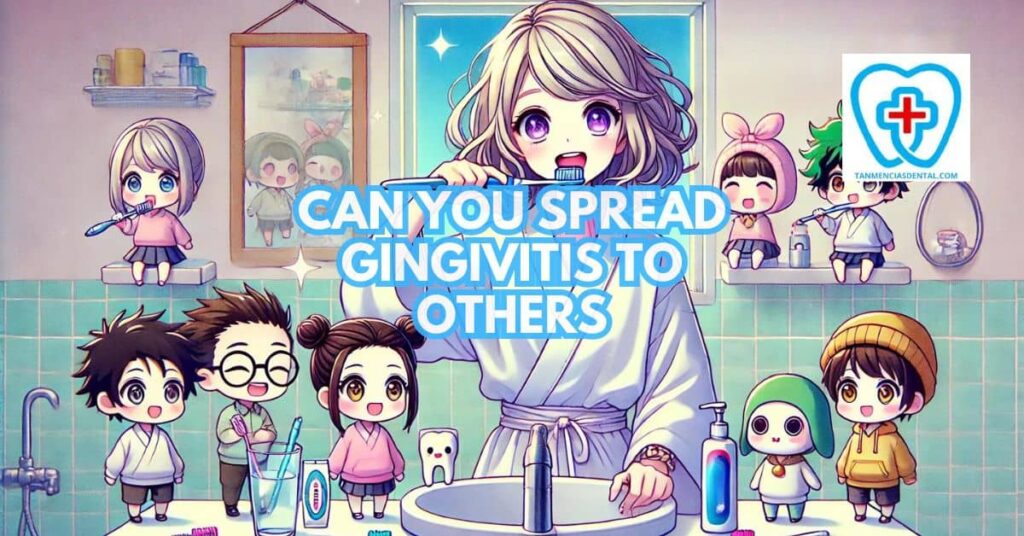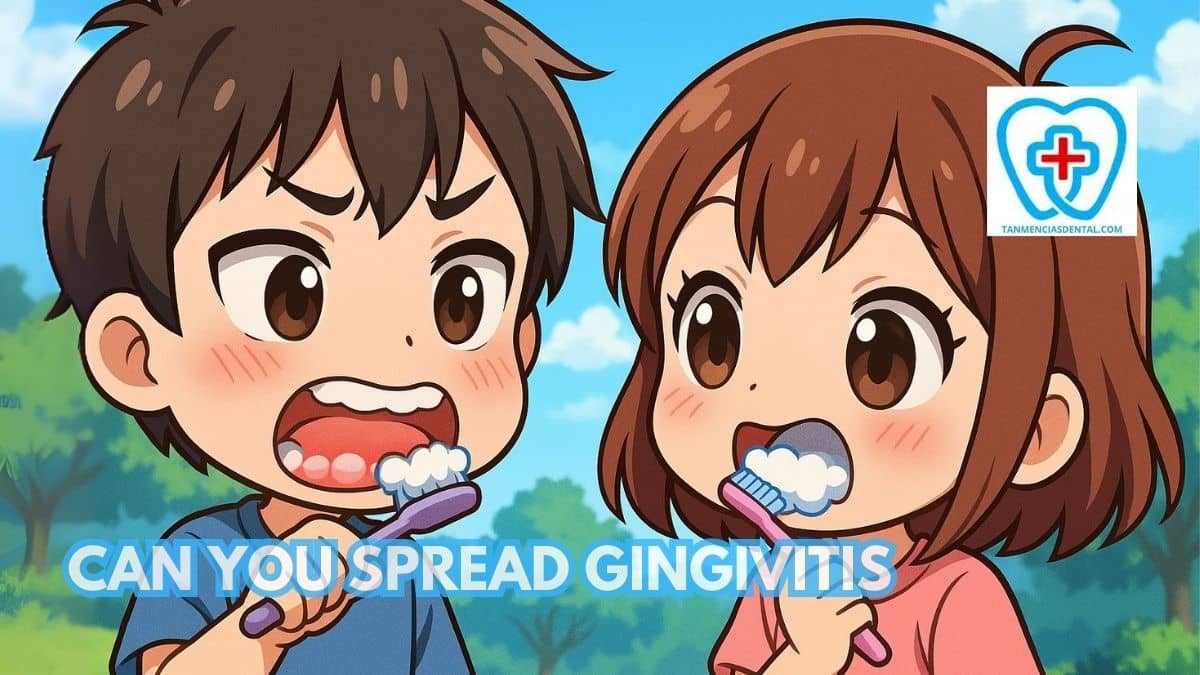Gingivitis is a common gum disease that causes redness and swelling of the gums.
Many people wonder, can you spread gingivitis to others through everyday actions?
While the disease itself is not directly contagious, the bacteria that cause it can pass from one person to another.
Understanding how these bacteria move and how to stop them is important for keeping your mouth healthy.
We’ll explain how gingivitis spreads and what steps you can take to protect yourself and those around you.
1. Understanding Gingivitis
Gingivitis develops when plaque, a sticky film of bacteria, accumulates on the teeth and gums.
If not removed through regular brushing and flossing, plaque hardens into tartar, which further irritates the gums and causes inflammation.
Symptoms of gingivitis include red, swollen gums that may bleed, bad breath, and gum tenderness.
These symptoms can often be painless in the early stages, making gingivitis easy to overlook.
It’s important to note that while gingivitis itself is not directly contagious, the bacteria that lead to gingivitis can be transferred between individuals.
Addressing gingivitis promptly by visiting a dentist is crucial to preventing it from progressing to more severe forms of gum disease.
Regular dental checkups and good oral hygiene practices are essential in managing and preventing gingivitis.
🦷 Brushing Your Teeth Too Hard? You Might Be Doing More Harm Than Good!
2. Contagious vs. Infectious: Gingivitis and Transferable Bacteria
While gingivitis itself is not contagious, the bacteria causing it can be spread between individuals.
This distinction is important because it highlights the role of bacterial transfer in the development of gum disease.
Contagious diseases spread directly from person to person, while infectious diseases involve the transfer of pathogens.
In the case of gingivitis, bacteria can be transferred through saliva, making it essential to understand and minimize behaviors that facilitate this spread.
Awareness of these differences can guide effective prevention strategies.
🦷 When Can You Eat After Brushing Your Teeth?
3. How the Mouth’s Bacteria Affect the Spread of Gingivitis
The mouth contains many kinds of bacteria, some good and some bad.
When the bad bacteria grow too much, they can cause gum problems like gingivitis.
People have different types of bacteria in their mouths, which can make some more likely to get gum disease.
If harmful bacteria are shared through saliva, it can increase the chance of gingivitis spreading.
Keeping a healthy balance of bacteria in the mouth helps protect gums and reduces the risk of passing germs to others.
🦷 How to Find the Best Dental Implants in Marikina Clinics and Specialists
4. Sharing Saliva and Spreading Gingivitis Bacteria
Saliva plays a significant role in the transmission of gingivitis-causing bacteria.
Activities such as sharing utensils, drinking from the same glass, or kissing can facilitate the transfer of these bacteria.
Even seemingly harmless actions, like tasting a child’s food before feeding them, can spread bacteria.
To reduce the risk of spreading gingivitis, it’s important to practice good oral hygiene and avoid sharing items that come into contact with saliva.
Maintaining personal oral care and being mindful of these behaviors can help prevent the spread of gingivitis-causing bacteria.
🦷 Can You Catch Gingivitis? Brushing Up on Contagious Gum Disease

5. Risk Factors for Gingivitis Transmission (One Person to Another)
Several factors can increase the risk of gingivitis transmission between individuals.
Poor oral hygiene is a primary risk factor, as it allows plaque and bacteria to accumulate, making it easier to spread.
Smoking and using tobacco products weaken the immune system and contribute to gum disease, increasing the likelihood of bacterial transfer.
A weakened immune system due to illness or medication also heightens the risk of contracting gingivitis-causing bacteria.
Being aware of these risk factors can help individuals take preventive measures to protect themselves and others.
🦷 Flossing for the Win: Best Floss for Gingivitis and Healthy Gums
6. Kissing and Gingivitis: How Likely is Transmission?
Kissing can transfer gingivitis-causing bacteria between partners, especially if one person has poor oral hygiene.
The risk of transmission depends on the overall oral health of both individuals.
Regular brushing, flossing, and dental checkups reduce the amount of harmful bacteria in the mouth, lowering the likelihood of spreading gingivitis.
Couples need to maintain good oral hygiene to minimize the risk of bacterial transfer.
Simple practices like brushing before kissing can also help reduce the chance of transmission.
🦷 How Much Does It Cost for a Dental Checkup?
7. High-Risk Scenarios for Spreading Gingivitis
Certain scenarios present a higher risk of spreading gingivitis-causing bacteria.
Sharing toothbrushes, which can harbor bacteria, is a significant risk factor.
Using the same eating utensils or drinking from the same glass also facilitates bacterial transfer.
Close contact with someone who has gingivitis, especially if they have poor oral hygiene, increases the risk.
Avoiding these high-risk behaviors and maintaining personal oral care items can help prevent the spread of gingivitis.
🦷 How Long Should You Brush Your Teeth With Braces?
8. Children and Gingivitis: Extra Care Needed
Children are particularly vulnerable to gingivitis due to their developing oral habits and immune systems.
They are more likely to share toys and objects that come into contact with saliva, spreading bacteria easily.
Parents should teach good oral hygiene practices from a young age, including regular brushing and flossing.
Supervising children’s oral care routines and ensuring they do not share items that can transfer bacteria is crucial.
Early education on oral hygiene can help prevent gingivitis in children and establish lifelong healthy habits.
🦷 How a Timer for Brushing Your Teeth Can Make You a Brushing Master
9. Preventing Gingivitis with Good Oral Hygiene
Good oral hygiene is the cornerstone of preventing gingivitis.
Regular brushing and flossing remove plaque and bacteria from teeth and gums, reducing the risk of gum inflammation.
Using an antibacterial mouthwash can help kill bacteria that brushing and flossing might miss.
Regular dental checkups and cleanings are essential for maintaining oral health and catching any signs of gingivitis early.
Consistent oral care practices not only prevent gingivitis but also improve overall dental health.
🦷 How To Make Brushing Teeth Fun For Toddlers
10. Treating Gingivitis (Treatment Options)
Treating gingivitis often begins with a professional dental cleaning to remove plaque and tartar.
Dentists may recommend an antibacterial mouthwash or a special toothpaste to help control bacteria.
Improving daily oral hygiene habits, including brushing and flossing more effectively, is crucial.
In some cases, dentists might suggest more frequent cleanings to monitor and manage the condition.
Early and proactive treatment can reverse gingivitis and prevent it from progressing to more severe gum diseases.
🦷 Why Are Tooth Doctors Important for Your Family’s Dental Care?
11. Untreated Gingivitis and the Risk of Periodontal Disease
If left untreated, gingivitis can advance to periodontal disease, a severe form of gum disease.
Periodontal disease can cause gums to pull away from the teeth, forming pockets that become infected.
This can lead to bone and tooth loss if not addressed promptly.
Untreated periodontal disease has also been linked to other health issues, such as heart disease and diabetes.
Early intervention and consistent oral care are critical to preventing these serious complications.
🦷 Reliable Family Dentist Services in Marikina City
👨⚕️ Conclusion
Maintaining good oral hygiene is essential for preventing gingivitis and its spread.
Understanding how gingivitis-causing bacteria transfer between individuals helps in taking necessary precautions.
Regular brushing, flossing, and dental checkups are fundamental practices to keep your mouth healthy.
Avoiding high-risk behaviors like sharing utensils and maintaining personal oral care items also reduces the risk of spreading bacteria.
By being mindful of these practices, you can protect yourself and others from gingivitis and ensure better overall oral health.
😊 Self-Promotion
Visit Tan-Mencias Dental Clinic in Parang, Marikina City, for top-notch dental care with a personal touch.
Our friendly team is dedicated to ensuring your smile stays bright and healthy.
Have questions or need to book an appointment?
Reach out to us anytime by calling 9171451074, sending a message through our Facebook page, or using our website’s contact form.
We look forward to making your dental experience comfortable and positive!

